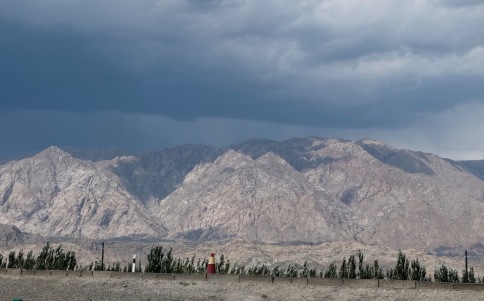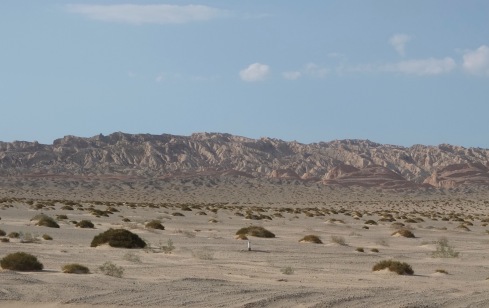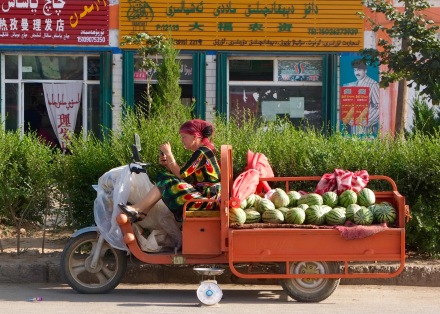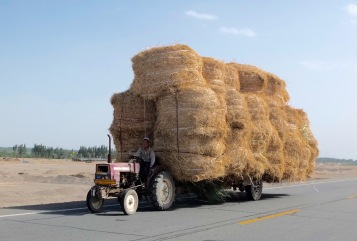On a long cycling trip, sometimes you get those days where you are just “going through the motions.” When the scenery around you is uninspring, the traffic steady you are merely pedalling to cover distance. On the long haul to Kashgar, I had several days like this. Sometimes it was difficult to stay off of the main highway and I grew tired of the monotonous Taklamakan desert scenery.
Of course, not all of it was dull.
I tried to stay on the smaller roads that paralled the highway. These little poplar lined streets were like portals into the past. Leaving the modern highway, I was soon pedalling beside little old men riding donkey carts. These two worlds existed parallel to one another and couldn’t be more different. If was on these backroads, resisting the modern world that one could see traditional Uyghur life unfold.
Leaving Korla I took the old road 317 until it eventually turned into a dirt track, which led me backtracking to the main highway. On the way I stopped for a lunch of laghman, my new favourite noodle dish. The lady serving me insisted that I sit at the back in front of a large air conditioning unit to stay cool. Soon she and few other kitchen staff sat around me and asked me a few questions. Unable to understand I took out my “Magic letter” written in Mandarin:
您好,亲爱的中国朋友,
我叫黛拉,是一个来自加拿大的女孩。骑自行车周游世界是我自儿时以来就有的梦想。我计划分别横穿亚洲和非洲大陆。具体路线是从蒙古到乌兹别克斯坦,然后经开罗骑行到开普敦。这次旅行预计持续18个月,行程2万5千公里。很开心中国将是我这次旅行中的一站。我会特意放慢我的脚步,细细欣赏这东方国度神秘而美丽的景色。
我会向我远在加拿大的朋友及家人讲述我旅途中见闻,讲述我所领略到中国风俗文化, 进述我所遇到的热情友好的中国朋友。
我已随身携带了旅行所需的全部物品,包括一顶帐篷和厨具,因此这次旅行花销都在我的预算范围内。
能够在这次漫长的旅行中遇到你,我的内心倍感激动。但是很遗憾,我无法用中文和您交流。
衷心希望您能帮我,使我的旅程更加安全和愉快。
谢谢,祝好!
黛拉
(Thank you to my friend Ye Huang for the translation)
and in English..
Dear Friend
I am a Canadian cycling around the world. My route is taking me across Asia from Mongolia to Uzbekistan and then into Africa from Cairo to Capetown. The journey will take approximately 18 months and will cover around 25,000 km. I am travelling slowly by bicycle as it gives me time to enjoy your beautiful country.
I am writing to my friends and family in Canada about my trip and will enjoy telling them about your culture and meeting local people. I am able to travel cheaply as I have everything I need on my bike including a tent and cooking equipment.
I am excited to be riding across your country and I apologize for not being able to speak your language.
I hope that you can help my journey to continue safely and happily.
Thank you.
With warmest regards, Tara
After that I was given many more smiles and thumbs up. They asked if I needed more noodles and a second heaping plate came my way. This was follow by a whole watermelon, and another plate of rice and mutton. Even for a starving cyclist, it was too much and I could barely finish it! At the end they refused to accept any payment and gave me another big bag of rice and meat to take with me. I was truly humbled by their kindness and I left that restaurant almost too full to ride, but very happy.
Late in the evening I managed to escape the highway again and ended up passing through a picturesque Uyghur village. Small rectangular homes surrounded by groves of apricot trees lined the road. I asked a local woman if there was somewhere that I could pitch my tent. I was taking a risk doing this as foreigners are technically supposed to stay in hotels every night. She offered me a place in her home to sleep that night. I followed her back to a very cosy little house. There, I met her husband and children. They gave me a bowl of fresh apricots from their garden and a vase of water to wash off. She made fresh laghman for dinner which was absolutely delicious. The language barrier was challenging as I only knew about three Uyghur phrases (and maybe five in Mandarin). The husband knew the word “yes” very well which he used many times. Many Uyghur people can speak Mandarin but cannot read it, so my Mandarin phrasebook was not as useful. Still, we got by well enough through the universal language of smiling and gestures. Later in the evening, I was visited by the Uyghur police. I was afraid that they would make me leave the village but they took photos of me and my passport and went on their way. I had a wonderful experience that night staying with the family.
 Down the road, the hospitality was never ending. One morning I stopped by some fruit sellers to buy apricots. When I said that I wanted five, they motioned for me to sit down and then handed me the whole box to munch on. As I said thank you and stood up to leave, they dumped another full box into some bags for me to take. It was ridiculously heavy to cycle, but I crammed them into my panniers anyway – eating apricots all day.
Down the road, the hospitality was never ending. One morning I stopped by some fruit sellers to buy apricots. When I said that I wanted five, they motioned for me to sit down and then handed me the whole box to munch on. As I said thank you and stood up to leave, they dumped another full box into some bags for me to take. It was ridiculously heavy to cycle, but I crammed them into my panniers anyway – eating apricots all day.
I also had many great encounters with the local police. The passport checks were frequent – at least 1-2 times per day. The police were just as keen on examining my passport as they were handing me over giant watermelons and cold drinks. One man came over to talk to me while I was having lunch and insisted on paying my bill. Another invited me into the station and insisted that I have dinner with them. I only had one unwanted encounter with police and even then it was with a pretty relaxed demeanour.
There is certainly a bit of paranoia in Xinjiang. This is felt by the heavy police presence. I also noticed right away that most gas stations were blocked off with barbed wire fences. When I wanted to buy gasoline for my camp stove, I found out that it was illegal for foreigners to buy gas. Even for Chinese citizens, only the driver was allowed inside and the passengers had to exit the vehicle and wait outside the fence. Foreigners were also not allowed to stay with locals in Uyghur villages, because it was deemed “unsafe”. After my first successful night of staying in a village I decided to make a second attempt. This time it didn’t work out so well.
35 km West of the city of Luntai I stopped in a small village in the late afternoon. After eating melons given to me by a shopkeeper and nan (bread) I decided to carry on. The lady said that I should take the highway because the road surface ahead wasn’t very good. I had no desire to go back to the highway so I said that I would try to continue straight. Sure enough, the road disappeared altogether and I ended up backtracking to the village. At this point, menacing clouds roared over head and thunder crashed. I knew that if I returned to the highway I would be stuck on it for a while. I asked the shop keeper if there was any guesthouse in the town that I could stay in. She said there wasn’t and offered me the use of a dirty old apartment by the store. I was grateful to have shelter from the storm that began to rage, but it was far from relaxing. Some annoying kids gathered around the window, yelling out “hello! hello! hello” and kept banging on the glass. I was worried about drawing too much attention. Right away, I wish that I hadn’t decided to stay. Sure enough, around 9pm, there was a loud bang on my door. Not surprisingly, a policeman stood outside. He told me to bring my passport and camera to the station. I felt very guilty for imposing on the locals. The man took me into the station and sat me down with about six other officers. I gave my innocent naive foreigner look again while they pondered what to do with me. One man spoke very little English and said that I could not stay in the village, but had to move to a hotel. The only hotel was 80km away in Kuqa or 35km back in the wrong direction to Luntai. I was definitely not keen on going backwards, so I lied and said that I would cycle all the way to Kuqa. They insisted that this was too dangerous and would arrange a taxi to Luntai for me. Eventually I had to accept that I would have to cycle the 35km again the next day. The officers were very polite and helpful and wanted to make sure that I would get to a hotel safely. I couldn’t really get upset since I was the one technically breaking the rules. So that night I paid more than I wanted to for a hotel, but it was luxury. I felt like I was paying $30 for a $250/night value back home in Canada.
Despite my run-in with the police, I still camped most of the way to Kashgar, but I had to be discreet. From the ugly city of Kuqa I was cycling very long days – covering around 160km and stopping around 9:30pm to camp. I had some of the most “interesting” campsites to date. One night I found a gap in the barbed wire fenced along the road and ran with my bike towards some hills near hydro towers. It was about 500m of pushing frantically out in the open until I could get out of sight. That night a crazy thunderstorm raged in the distance and I was certainly glad it didn’t come any closer. On my ride across to Kashgar, I definitely experienced some extreme weather. At least once a day there was a short, but powerful thunderstorm. Then, mixed with a sandstorm, created another beast altogether.
I experienced several sandstorms on my ride across. Normally riding was possible, covering my nose and mouth with a buff and wearing sunglasses. There was one such storm, however that was too dangerous to attempt to cycle through. Visibility was reduced significantly and the sand became mixed with rain – whipping a sludge mixture through the air at breakneck speed. So I hid under a tunnel for 30 minutes and let the storm pass. After riding through dull scenery all day, it provided me with some much needed entertainment.
After the storm had passed I was able to ride an amazing tailwind for the rest of the day. The wind throughout the ride was very unpredictable, but I was lucky enough to have tailwinds most of the time. I was eager to get to Kashgar, pushing hard through heat and terrible saddle sores that were only relieved by a double daily dose of ibuprofen. The kind people along the way and the delicious food helped to carry me through. One man gave me a cold green melon that was perhaps the most delicious piece of fruit I have ever had in my life. The sweetness, dripping juice was like medicine in the heat. In my state of fatigue it was hard to describe how good this melon tasted. Even now, its taste lingers.
I was thrilled to finally be in Kashgar, staying at the Old Town Youth hostel, where my bicycle joined several others. I met many interesting travellers including one from Russia who was also headed to Pakistan (not by bike). I didn’t think I would find anyone else! With the oppressive heat I spent several lazy days hanging around the hostel, chatting to other travellers. At night I visited the lively night market, sampling various types of Uyghur cuisine. I tried many types of kebabs including some kind of testicle, which was surprisingly tasty. I also tried a delicious mixture of yogourt, ice shavings and honey, which my stomach paid for later. More exotic dishes such as goat’s head soup were also available.
In Kashgar, the Uyghur culture is thriving. Chaotic streets in the old town were crowded with vendors selling fruit, sweets, bread, clothing and other miscellaneous goods. A chorus of men shouting to advertise their various products on offer joined the constant roar of motorbikes whizzing through the narrow streets. I also witnessed the skinning of a goat that had just been slaughtered. Smells of grilled meat wafted through the air. Kashgar was a thriving and fascinating place, if a bit exhausting at times. Unfortunately a lot of the old town has been destroyed in attempt to modernize the city for “economic progress.” Kashgar is also famous for its Sunday livestock market which I was unfortunately unable to attend due to an expiring visa. Kashgar is the official start of the Karakoram highway into Pakistan.
I had a lot of climbing out of Kashgar to get to the mountains again. The first day was extremely hot and after 80km I hit road construction. The road was quite broken in parts and I was eating dust from passing trucks. It looked like a freeway was being built beside the old highway, with some significant bridge construction.
The mountains grew higher and higher and I finally hit smooth paved road near a beautiful aquamarine lake.
This continued all the way to stunning Karakul Lake at over 3000m, surrounded by Kyrgyz yurts. The locals were friendly if a bit pushy, with many boys approaching me on motorbikes trying to get me to stay in their yurts. Eventually I agreed to pay for dinner and breakfast in a yurt and pitched my tent near the shore of the lake. The cool temperature was a relief after the scorching heat of Kashgar. I slept very well that night.
The next morning I cycled the final 100km to Tashkurgan over the Ulugh Rabat pass at 3955m. While it was supposed to be downhill most of the way to Tashkurgan, strong headwinds made it a very unpleasant ride. I passed many small Tajik settlements on the way. The border town of Tashkurgan is also mainly Tajik. I met several people from my hostel in Kashgar, including my new Russian friend Semen that would take the mandatory bus to Sost in Pakistan with me the next day. Since 2001, the Chinese have banned cyclists from riding the 200km stretch of no man’s land between China and Pakistan. Because of the Muslim Eid holidays, many Pakistanis were taking the bus and we worried that we wouldn’t be able to get a seat. I had to, as my Chinese visa would expire in two days.
The next morning we got up unnecessarily early to get our tickets, only to find out that Chinese customs would open almost four hours later. I talked to several Pakistanis waiting in the crowd and was already given several numbers to call in case I needed any help at all while in the country. The Pakistani hospitality had already begun. I was relieved when I finally got my ticket. I had butterflies in my stomach as I boarded the bus to Pakistan. One of my long-time dreams would soon be a reality – I was about to cycle the Pakistani Karakoram highway, a truly legendary road.



































Tara you are an amazing storyteller!! xo
LikeLike
Tara your stories on your journey and photos are truly wonderful, interesting and insightful. What you have written and published so far on your blog is a book just waiting to be printed. You are amazing Ms. Leigh. Thank you for sharing your journey with us and raising awareness regarding The many people and cultures you were meeting on your way in this big world out there that so few of us get to see and experience. Xoxo
LikeLiked by 1 person
Hi Tara, great adventures in Xinjiang, I am planning to go there in June and have been reading a lot about the northern part by Altay area. Have you travelled a lot around Xinjiang? I would really appreciate some advice of where to go (for hiking and authentic cultural immersion) for 7-10 days, and avoid all the touristic places. I have Kanas lake and Koktokay on the list, but worried about the developed tourism it has embraced.
LikeLike
I have noticed you don’t monetize your page, don’t waste your traffic, you can earn extra bucks every month because you’ve got
high quality content. If you want to know how to make extra money,
search for: Boorfe’s tips best adsense alternative
LikeLike